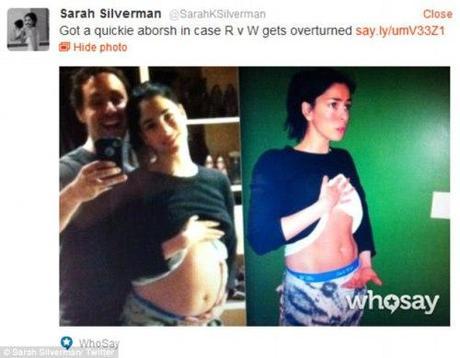Washington Post: From the first words out of her filthy, brazenly irreverent mouth, the stand-up comedian Donna Stern goes there. Working a room of Brooklyn hipsters in a cramped club on open-mike night, she doesn’t just work blue: She works teal, azure and shades of aquamarine that haven’t even been discovered on the light spectrum yet.

Comedy…
“Obvious Child,” a provocative romantic comedy from new writer-director Gillian Robespierre, opens with Stern doing one of her bits, giddily sharing the most intimate secrets of her day-old lingerie like a cross between sweet-faced, foul-mouthed Amy Schumer and Jerry Seinfeld. Donna is played by “Saturday Night Live” alum Jenny Slate, who possesses the same good-girl cuteness of Schumer and Sarah Silverman, and the same shocking subversive streak. As her business-school-professor mother complains at one point, she’s such a smart, nice Jewish girl who passed her SAT with flying colors. “And now you waste that 720 verbal telling jokes about having diarrhea in your pants.”
That’s one of the few lines in “Obvious Child” that can be repeated in a family newspaper. The queasy, prudish and easily offended should be forewarned that Robespierre, like so many of her contemporaries, clearly sees profanity as a legitimate arrow in the quiver of liberation, a mode of bracing, confrontational candor that instantly disarms fusty structures of sexism and other depredations. When Donna’s best friend, Nellie (Gaby Hoffmann), uses a common epithet for the female anatomy to fulminate against the Supreme Court, she’s appropriating the rhetoric of oppression and using it, jiujitsu-like, to strike back.
That’s one reading. Seen through another lens, Donna and her friends’ constant — and often unfunny — swearing and nattering on about sex and other bodily functions resembles a group of little kids seeing just how much they can get away with before being sent to permanent timeout. That immaturity is at the core of “Obvious Child,” in which Donna gets dumped, loses her job and faces an unplanned pregnancy after a drunken one-night stand. The whole point of the film is that she’s unformed, using her 20s to experiment and make mistakes and, in the case of deciding whether to terminate her pregnancy, make the decisions that will ultimately create a more experienced — maybe even wiser and more compassionate — adult human being.
That balance — between annoying, cavalier self-involvement and genuine vulnerability and growth — is what keeps “Obvious Child” interesting, making it one of the most startlingly honest romantic comedies to appear onscreen in years. Donna and her friends aren’t always likable: They’re spiky, sharp-elbowed and unremittingly coarse, making viewers of a certain age long for just a little more softness between them. As with “Girls,” the HBO show that most clearly shares “Obvious Child’s” young-feminist DNA, the most nuanced and sympathetic character isn’t Donna or her female friend, but a guy — in this case, sweet-natured Max (Jake Lacy), the wholesome, unsuspecting straight arrow who may or may not be a father by the time Donna has made her own choice.
That choice, and how it’s depicted, vaults “Obvious Child” beyond just another savvy New York indie and into cultural watershed territory: After years of movies that depict abortion as a non-option (the worst offender being “Juno,” which had to set up the straw man of a dingy, disgusting clinic for the teenage heroine to continue her pregnancy), “Obvious Child” dares to portray Donna’s decision in a way that’s serious and emotionally consequential but not fraught with crippling anxiety, shame or regret.
Because Donna processes everything through her comedy, “Obvious Child” occasionally tiptoes and then stomps right over the line of good taste. There are one-liners that seem designed to validate every negative stereotype of callous urban liberals ever concocted by the far right. But Robespierre has the courage to take those interpretive lumps, in service to a larger point: that we’ve reached a moment in our social, political and cultural life when the non-punitive portrayal of a woman exercising her right to a safe and legal abortion is considered more taboo than the numbing succession of murders, maimings, disfigurements and assaults we consume on a weekly basis in movie theaters and on TV.
Through it all, even despite her crankiest, most selfish and adolescent moments, Donna earns the audience’s support, thanks largely to the inherent sweetness Slate brings to her screwed-up but lovable character. There are as many awkward, discomfiting sequences in “Obvious Child” as there are interludes of genuine fun and romance. The result is a movie that feels risky and forgiving and, despite its traditional rom-com contours, refreshingly new. If we can stipulate that existence is an inherently messy affair, ungainly and contradictory and confoundingly unresolved, then “Obvious Child” may be the most pro-life movie of the year.

“Compassion”
Only in a twisted mind is a “comedy” about abortion a pro-life movie.
See also:
- Let’s Make Abortion Fun & Trendy!
- Sarah Silverman Faked Abortion (to Trick Young Girls Into Having Them)
- The blasphemy of Sarah Silverman: Jesus is pro-abort
- New poll: 62% Americans see abortion as ‘morally wrong’, 84% support restrictions
h/t Newsbusters
DCG

